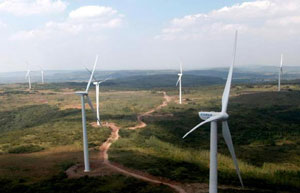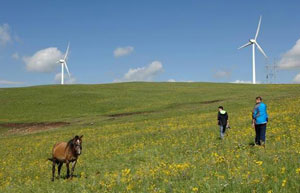
According to Hagen, the growing Chinese middle class will trigger more demand for aluminum in sectors like construction, automobiles and transportation.
Sapa, whose 50 percent shares are owned by Orkla, formed a joint venture with Chinalco, China's biggest non-ferrous metals company, in 2011. The venture - Sapa Chalco Aluminum Products (Chongqing) Co Ltd - mainly produces high-end aluminum products that are used in high-speed trains, inter-city metros, freight cars and trams. The JV already has several clients in China including coal giant Shenhua Group, CSR Corp Ltd, CNR and several other international car builders. In North America, Sapa currently supplies all the aluminum parts for electric carmaker Tesla Inc.
Hagen believes that "aluminum demand will remain huge in China" as the country's urbanization and industrialization will continue for many years. China's rapidly developing transportation system will trigger huge demand for high-end aluminum products, he said.
Ren Xudong, vice-chairman of the China Non-Ferrous Metals Industry Association, during a recent industrial conference, said that China's demand for aluminum products would continue to increase on the back of a boom in the country's construction, power and auto industries.
"The use of aluminum products in China is much less than that in Western countries," Ren said. "For instance, up to 80 percent of the railway trains in the US and Australia adopt aluminum structures whereas in China, the figure is just 37 percent.
"In developed countries, aluminum is widely used in construction, while 70 percent of China's buildings still use timber," he said.
Ren believes that the demand for aluminum products in China will reach 20 million metric tons in the foreseeable future due to the boom in construction and transportation sectors.
Hagen, shares similar optimism but is more focused on the Chinese government's efforts to save energy and cut emissions.
"Aluminum products offer the best hope in this regard as they are lighter, greener and have long lifecycles," he said.
Although Hagen's aluminum investments in China have mostly been in the high-end segment, he is eyeing opportunities in other segments also.
"There are no limits to our investments in China," he said.
According to Hagen, Orkla has also invested in a paint factory in China by teaming up with local companies. He indicated that the company plans to further expand its businesses in this sector. With food security becoming a major concern in China in recent years, several high-end foreign food firms and supermarkets have witnessed a sales boom in the first-and second-tier cities. Hagen indicated that his company is not averse to tapping such options in China, as his group has a good track record in the consumer goods sector. Hagen is also looking to team up with more State-owned companies and feels that his association with Chinalco will come in handy.
Unlike several of his peers, Hagen has been involved with so many businesses and sectors that it is difficult to pin him down to any particular segment.
Hagen, along with his father, set up discount supermarket chain Rimi in Norway in 1970. That was also the year when he undertook his first trip to China. He subsequently sold Rimi to Swedish retailer ICA AB and Dutch retailer Ahold in 2000. Most of the money that he earned from the sale was plowed back into Orkla.
|
 |
 |
| Renewables get a China push | China remains top destination for clean energy investment |